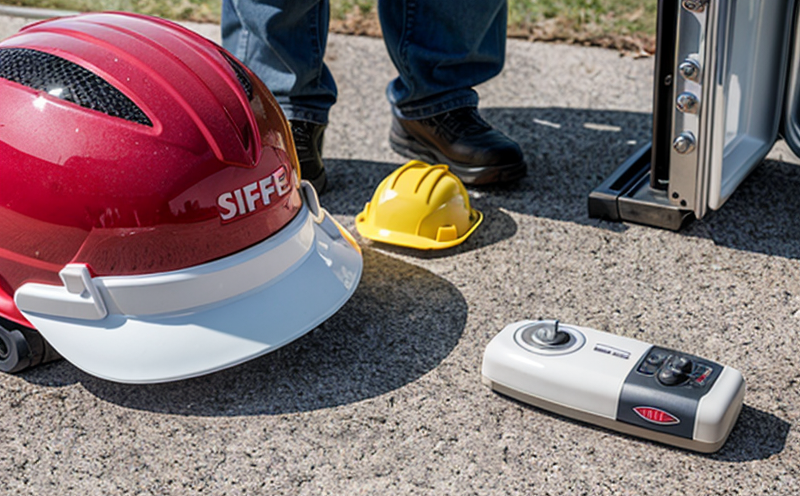ISO 18839 Parachute Rocket Signal Testing
The ISO 18839 standard pertains to parachute rocket signals used in marine and ship equipment. These devices are essential for ensuring the safety of personnel during emergencies, providing a reliable means of signaling distress or location to nearby vessels or rescue teams.
Compliance with this standard is crucial for manufacturers and suppliers who need to prove that their products meet the rigorous requirements set forth by international maritime regulations. The testing process outlined in ISO 18839 ensures that parachute rocket signals perform reliably under various environmental conditions, including wind resistance, water immersion, and temperature variations.
Our laboratory offers comprehensive testing services for these devices according to ISO 18839, providing detailed reports on performance metrics such as ignition time, signal brightness, effective range, and durability. We utilize state-of-the-art equipment and follow stringent protocols to ensure accurate and consistent results.
The importance of this testing cannot be overstated, especially in the context of marine safety. A malfunctioning parachute rocket signal could result in critical communication failures during emergencies, potentially leading to loss of life or severe accidents. Our service ensures that all aspects of these devices are thoroughly evaluated, thereby enhancing overall maritime safety standards.
In addition to standard testing, our lab also provides certification services for manufacturers seeking compliance with ISO 18839. This includes conducting initial assessments, issuing reports based on test results, and assisting clients in addressing any non-conformities identified during the evaluation process.
Our team of experts understands the specific challenges faced by those working within this field and is committed to delivering high-quality testing solutions tailored to meet individual client needs. By leveraging our expertise and advanced facilities, we aim to help ensure that every product meets or exceeds the stringent requirements set out in ISO 18839.
Scope and Methodology
| Test Parameters | Description |
|---|---|
| Ignition Time | The time it takes for the rocket to ignite upon deployment. |
| Signal Brightness | The intensity of light emitted by the parachute rocket signal when activated. |
| Effective Range | The distance over which the signal can be effectively seen or heard. |
| Durability | The resistance to environmental factors such as moisture, salt spray, and extreme temperatures. |
| Water Immersion | Ability of the device to function properly after being submerged in water for a specified duration. |
| Wind Resistance | Performance under conditions where strong winds may affect signal visibility or effectiveness. |
| Temperature Variation | The ability to operate correctly across a range of temperatures, from freezing cold to scorching hot. |
In addition to these physical tests, we also conduct functional assessments involving simulated deployment scenarios in controlled environments. These simulations help us evaluate the overall performance and reliability of each parachute rocket signal under realistic conditions.
Our laboratory adheres strictly to ISO 18839 guidelines throughout all stages of testing, ensuring that every aspect of the product is thoroughly examined. This includes detailed documentation of test procedures, results, and recommendations for improvement where necessary.
Customer Impact and Satisfaction
The impact of our ISO 18839 parachute rocket signal testing service extends far beyond mere compliance with international standards; it significantly enhances the safety and reliability of marine equipment. By ensuring that all parachute rocket signals meet the highest quality benchmarks, we contribute directly to reducing risks associated with maritime emergencies.
Our commitment to customer satisfaction is reflected in our consistent delivery of accurate test results and actionable insights. Clients often cite improved product performance following our evaluations as evidence of how our services add value to their operations. Furthermore, many have reported enhanced confidence in choosing compliant products based on the rigorous testing processes we employ.
We understand that maintaining a competitive edge requires more than just meeting basic requirements; it involves exceeding expectations wherever possible. Through meticulous attention to detail and unwavering dedication to excellence, our laboratory helps clients achieve this goal by offering unparalleled quality assurance services.
Use Cases and Application Examples
The primary use case for ISO 18839 parachute rocket signal testing is in the manufacturing of safety equipment intended for maritime environments. This includes but is not limited to lifeboats, rescue boats, survival suits, and other emergency gear.
For example, a manufacturer developing a new model of lifeboat would require comprehensive testing of its distress signaling system as part of the overall certification process. Our laboratory plays a crucial role in this by providing detailed reports on how well the parachute rocket signal performs under various conditions.
Another application involves ongoing quality control checks for existing products already approved to ISO 18839 standards. Regular testing ensures continuous compliance and helps identify potential issues before they become critical problems.
We also assist in research and development efforts aimed at improving current technologies or introducing innovative solutions. By participating early on in the design phase, we can offer valuable feedback that guides product evolution towards greater safety and efficiency.





